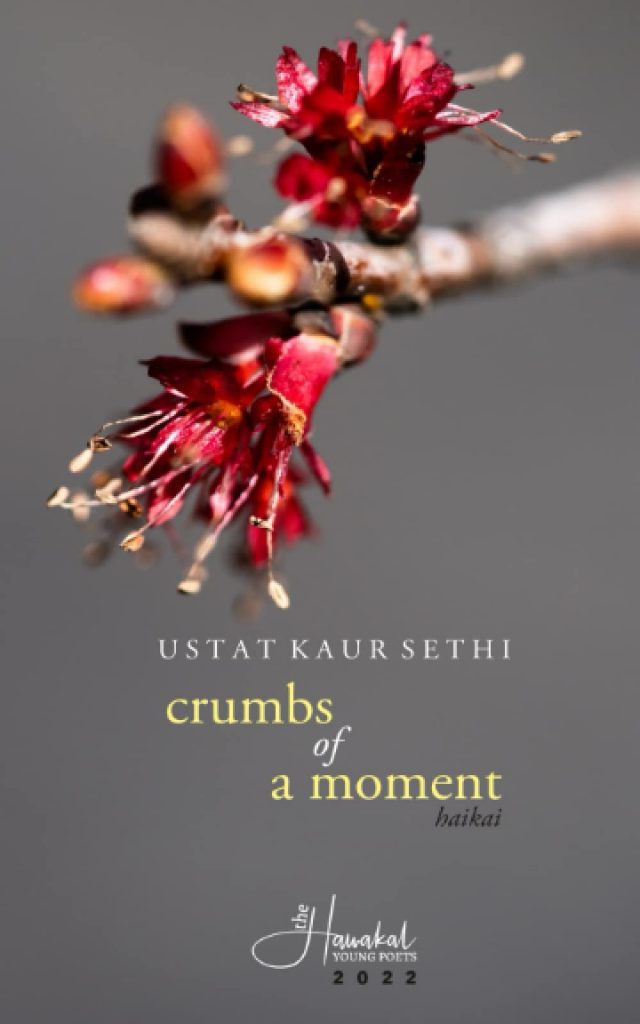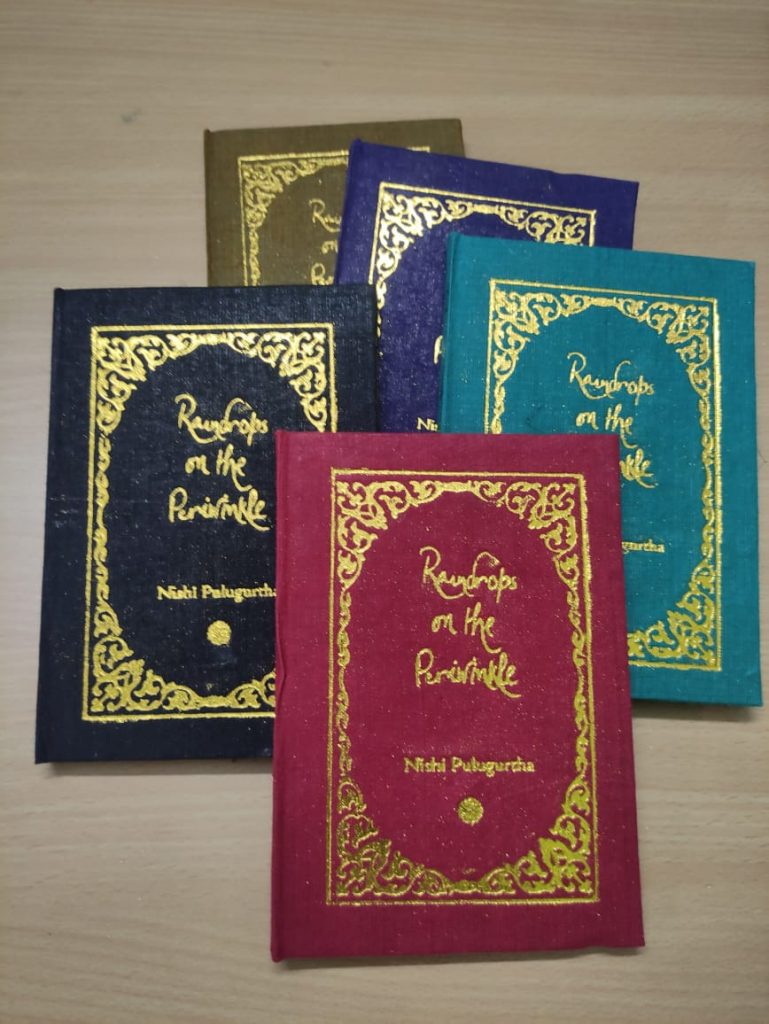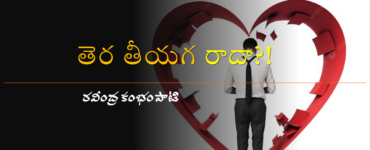Microform poetry has become very popular in India and haiku dominates the scene. Apart from the economy of space, it is also a mental exercise, that focuses on the acuity of thought and precision of expression. These forms suit the fast-paced urban lifestyle too, offering readers oases of small repose. Just before the city of Kolkata got submerged in its festive mood, I laid my hands on two such volumes of microform poetry. It suited my mood and time. Both are very slim volumes and fit to be finished at a go. I enjoyed taking small peeks into both these slim volumes and the pieces kept playing on in my mind amid all the hullaballoo of the Durga Puja.
Ustat Kaur Sethi, a young girl yet not out of her teens, has just got her first poetry anthology, Crumbs of a Moment published by Hawakal Publishers as a part of their endeavour to promote young poets. It is a very slim volume which one can finish reading in half an hour. But the poems do not end there, they stay with the reader. The blurb says that her poems ‘revealed an excessive use of metaphors’ which enable the readers to decipher the hidden meanings. There is a freshness in Ustat’s poems which appeals to the readers and makes them ponder. Though there is neither a contents page nor any clear visual demarcation, the book is divided into seven sections, each beginning with a quotation that sets the tone for that section. Roughly, I find the sections can be divided into nature, fauna, art, flora, irony, Punjab, and moments. The poems included in this anthology are chiefly haiku, one-line haiku and haibun, giving us a glimpse into the imaginative space of the young mind. The anthology opens on a cheerful note with an award-winning haiku:
midnight showers
I greet a jewelled world
at dawn (9)
The freshness of these haiku lies in their apparent simplicity and novelty of metaphors:
Wind blowing into the sound of pollens trumpet blossoms (30)

The auditory and sensory images create a unique picture of birth in nature. Yet the city girl, the digital native also comes across through her writings –
Ulsoor Lake
the faded colours
of city life (13)
e satsang
forgetting the chants
grandma fakes
network issues (37)
Ustat shows a desire to play with words, to quip, a tongue-in-cheek response of the young to the imperfections of the world but she also maintains a balance in doing the same. Some of her compositions carry caustic humour with effortless ease –
parliament sessions
the speaker still ironing
his shirt (12)
Though this haiku finds a place in the first section, given its tone of sarcasm, I thought it better fitted the part where other ironical ones had been placed. But then, in a poetry anthology, placing cannot be sacrosanct, there’s always an overlapping of ideas.
Her writings on Punjab bring out the anxiety, violence and pain that the state has gone through –
in the veins of a ruined state an adulterated promise to be (42)
Her haibuns are perfect frames to hold certain particular moments of life, and require special mention. The moment section, which is also the last section of the anthology ends with an apt closer –
dinner time banter
I scrape together
the crumbs of a moment (53)
It is these crumbs of moments that have created this anthology. Snippets of life, as observed by the young poet have culminated into a beautiful collection of microform poetry. Ustat Sethi’s compositions hold immense promise for the future. The micro-form poems bring out the sharpness of her thoughts as well as her command over the language of expression and are a pleasing read for anyone who enjoys form poetry.
The other microform poetry anthology that I came across in the past few days is Nishi Pulugurtha’s Raindrops on the Periwinkle published by Writers’ Workshop with its characteristic hard-bound cover and calligraphic title. Nishi Pulugurtha had been writing poetry for quite some years now and has been widely published. This is her second anthology of poems, where she explores various micro forms of poetry. The volume comprises poems, mostly composed during the lockdown and, as the poet herself mentions in the preface,
“The little bit of nature around me that I could see in my locked-in state, during my evening walks on the terrace with the blue sky above, the myriad cloud shapes, the birds headed home…the trees and plants in my small green space… and Amma who has Alzheimer’s disease, became the subject matter of my form poems as well”
One of the characteristic features of Nishi Pulugurtha’s poetry is that they are born from her lived experiences. The nature haikus bear the stamp of an observant eye that perceives poetry in mundane surroundings and everyday living. Whatever she sees around her becomes the subject of her verses. Drawing from the immediate experiences, Pulugurtha’s verses provide the comfort of familiarity. It’s like a known space that one feels comfortable in and enjoys revisiting.
fiery bright yellow
amaltas sunny shiny
In isolation (17)
The beauty in the mundane is skilfully brought out in the haibuns included in the anthology. The last piece of the anthology, a haibun, is a perfect example of finding poetry in the familiar, picturing a child in the open fields and buzzing nature all around him –
He walks around, runs a little, talks a lot. In his hand a ladle, that is his mobile, he says…A lonely bee flits on the daisy and settles down in a while
Springtime feel
As life meanders
Pauses too (60)
Home is a recurring metaphor in this micro anthology. The pandemic enforced the binary of home and the world upon us where home became the metaphor for safety and repose. But long hours, forced companionship and a complete lifestyle change questioned the utopian and simplistic conception of home. Enclosed within four walls, the home becomes both a shelter as well as confinement –
at home in my space
working things differently
one at a time – slow (15)
Another important theme in Pulugurtha’s writing is dementia. There is a poignancy and acceptance in the pragmatic tone of these compositions which excludes any kind of exaggerated melancholia or dramatization of emotions. Her activism for mental health issues finds a creative channel through verses.
words fail to come out
refuse to as she tries hard
so much still to say (26)
or
she reaches to hold
my hands as if to say things
will be all right soon (28)
There is a stark simplicity in Nishi Pulugurtha’s verses that appeals to the readers. There’s no abundance of metaphors to obscure the meanings. The poet is in direct communication with the readers, expressing her interactions with nature, society, and self. This austerity suits the microform of poetry that she explores in this anthology.
Both these anthologies of micro-form poetry are important additions to the oeuvre of Indian writings in English, a genre that is gaining strength day by day. Poetry enthusiasts would enjoy these miniature verses for their economy of words and specificity of images.
*









It was wonderful to read Ustat, the young writer will go places. The clarity brought to table at this tender age is reflective of the depth of reading and interest. Looking forward to more of her writings.